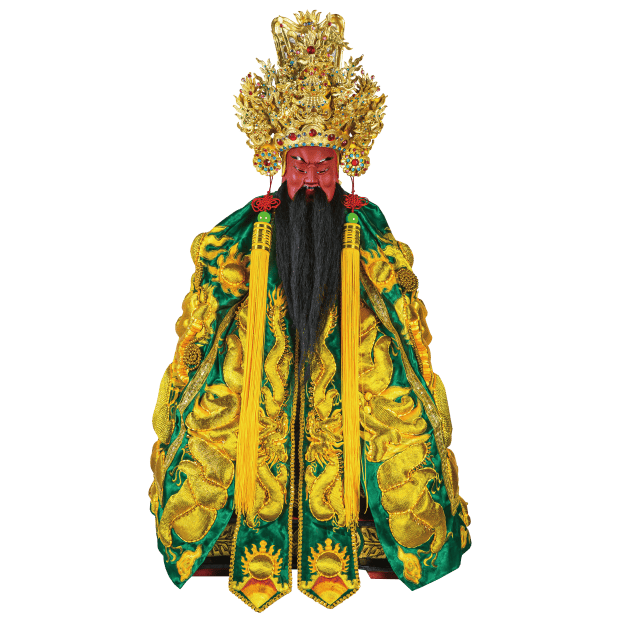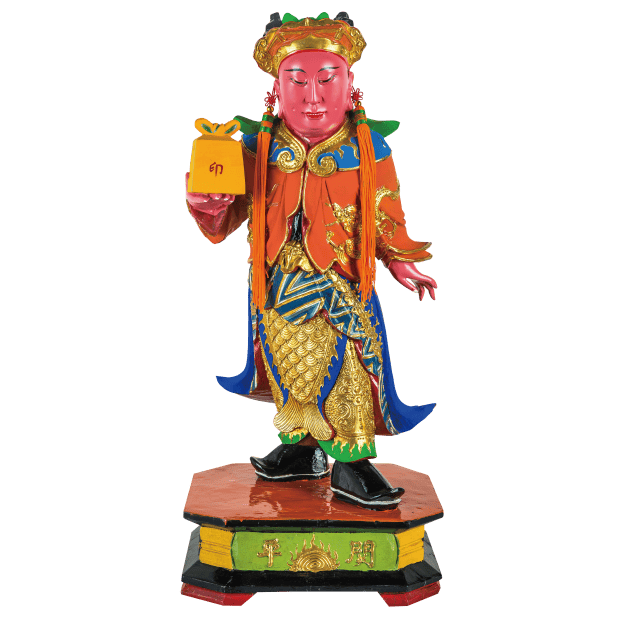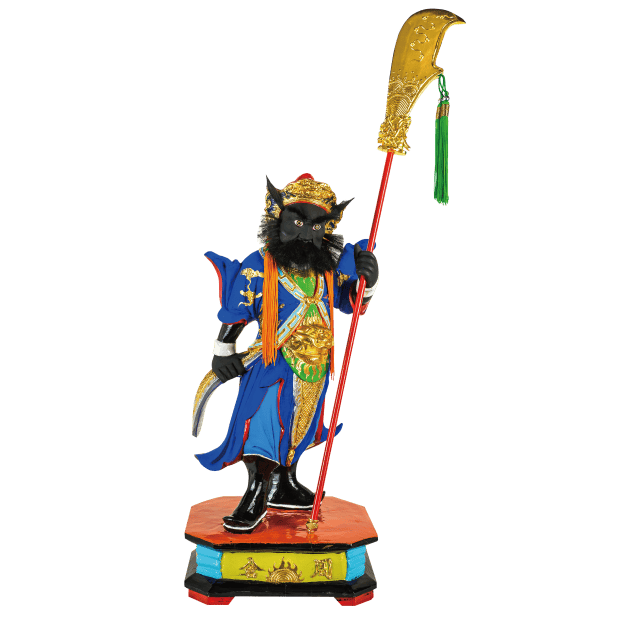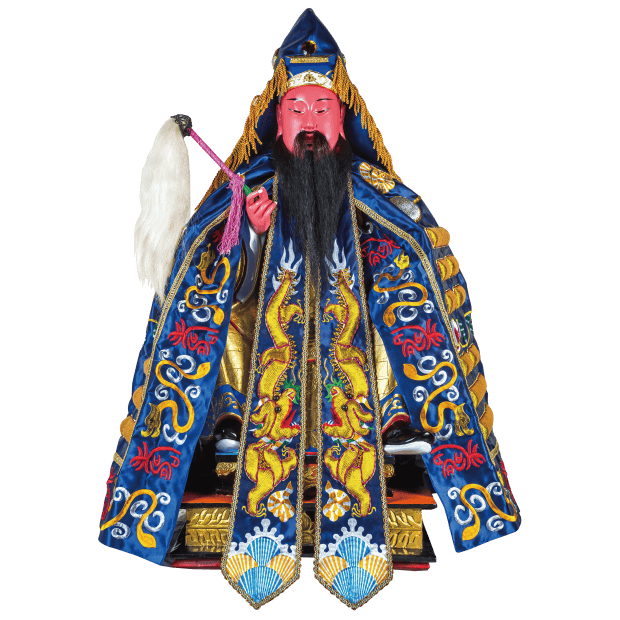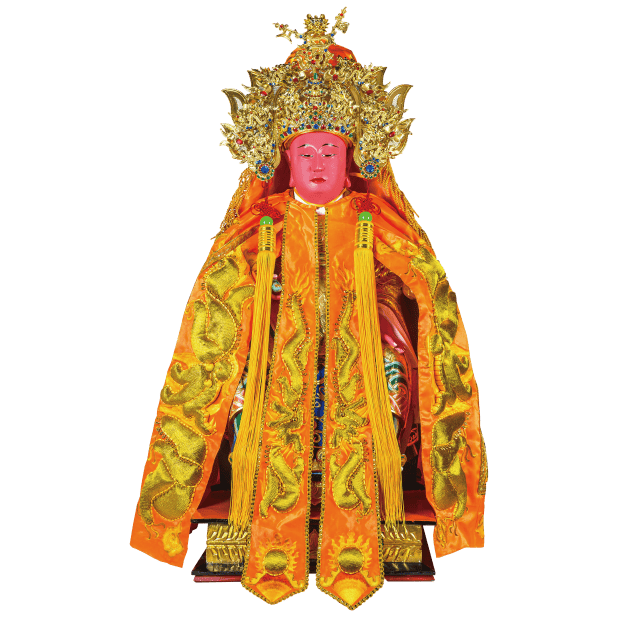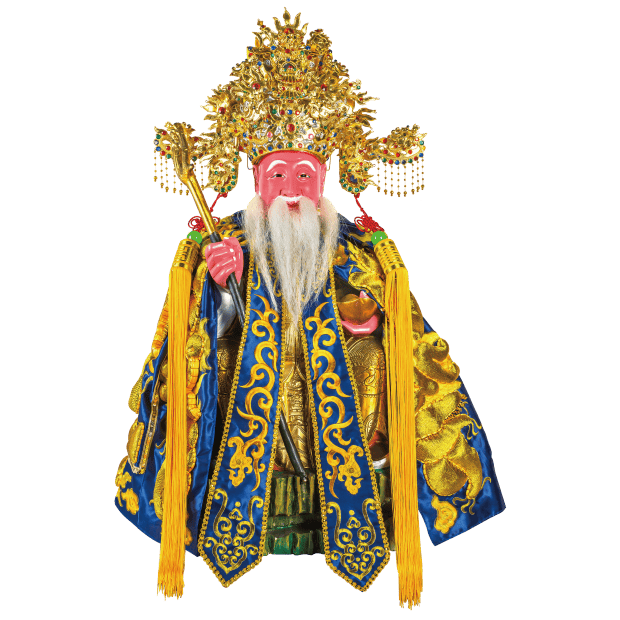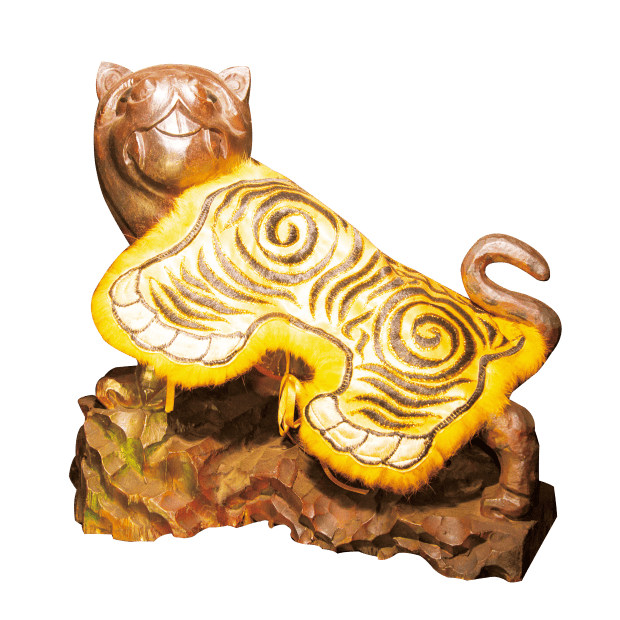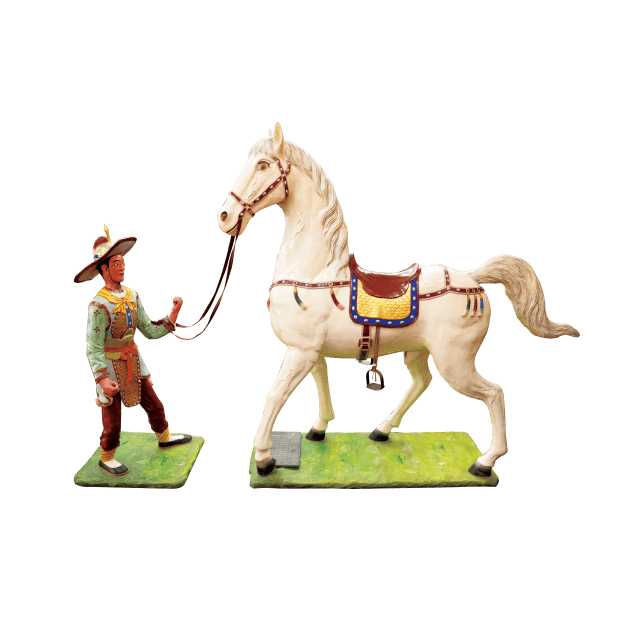First Floor - East Wing
-
Read More
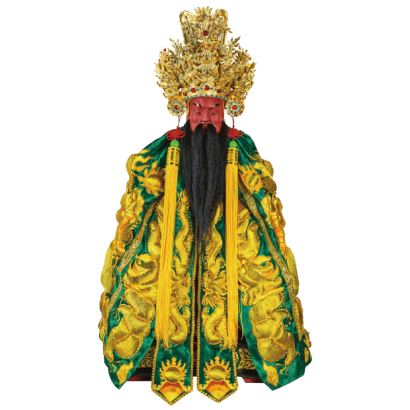 Holy Emperor Lord Guan
Holy Emperor Lord GuanHoly Emperor Lord Guan
♦Sacred birth celebrated on the 24th day of the 6th lunar month♦
Surnamed Guan, given name Yu, formal name Yunchang, Holy Emperor Lord Guan was born in Jie County in Hedong on the 24th day of the 6th lunar month during the second year of the reign of Emperor Huan of Han (157 A.D.), and passed away on the 7th day of the 12th lunar month in the 24th year of Emperor Xian of Han (213 A.D.) According to the General Historica of Taiwan Province, worship of Holy Emperor Lord Guan in Taiwan began during the time of Koxinga, King of Yanping, when a group of merchants collaborating on a business venture with a shared sense of honor, chose Guan Gong as their patron god for his sense of honor. According to folklore, emperors throughout the dynasties established shrines to Holy Emperor Lord Guan. Holy Emperor Lord Guan is also worshipped in Daoism, Buddhism, and Confucianism, hence, he is known by many other monikers. -
Read More
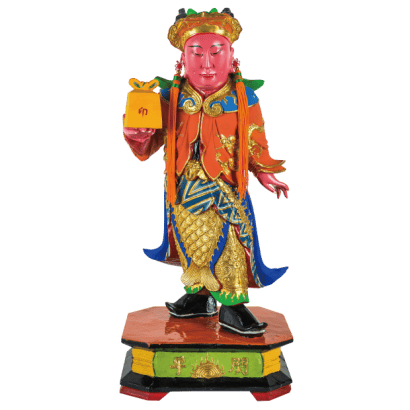 Guan Pin
Guan PinGuan Pin
♦Sacred birth celebrated on the same day as Holy Emperor Lord Guan♦
In The Records of the Three Kingdoms, Guan Pin followed his father into war, and was captured along with his father Guan Yu and executed by Sun Quan. Guan Yu was deified posthumously, and generations of leaders and people established temples to honor and worship him with offerings. Guan Pin is depicted holding a seal in his right hand with a powdered complexion, and rouged lips. He is a young, handsome, pale-complexioned divine general. -
Read More
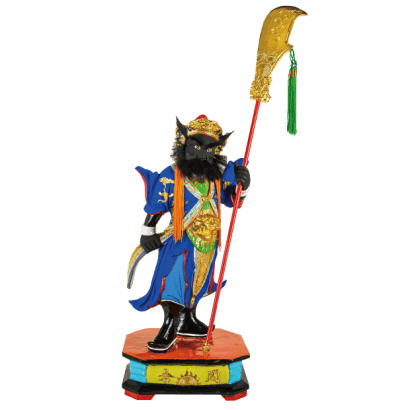 Zhou Chang
Zhou ChangZhou Chang
♦Sacred birth celebrated on the same day as Holy Emperor Lord Guan♦
As recorded in General Historica of Shanxi, he is a native of Guanxi. Originally under the command of Zhang Bao, leader of the Yellow Turban f Bandits, he became a collower of Guan Yu when the Yellow Turban militia were defeated. He took his own life on news of Sun Quan beheading Guan Yu and his son after the fall of Maicheng. Guan Yu was deified posthumously, receiving worship and offerings, and the Great General Zhou stands to the left ofHoly Emperor Lord Guan holding a Green Dragon yanyuedao weapon. -
Read More
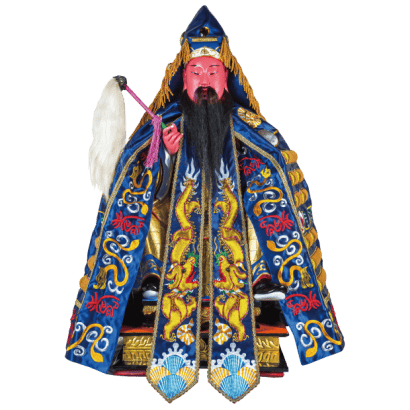 Fuyou Emperor Lord
Fuyou Emperor LordFuyou Emperor Lord
♦Sacred birth celebrated on 14th day of the 4th lunar month♦
Lü Dongbin, colloquially known as Lü Yan, is colloquially referred to as Fuyou Emperor Lord, Lü Pure Yang, Master Pure Sun, Xian Gong, Lü Ancestor, etc. Called Miaodao Heavenly Venerate by Daoists and Wenni True Buddha by Buddhists, he is one of the Eight Immortals of folklore. Lü Dongbin is also one of the five distinct Gods of Wen Chang and is often worshipped alongside Guan Gong, Master of Vermillion Cloak, Kui Xing, and Lord Wenchang. He was bestowed the title of Pure Yang Yanzheng Jinghua Emperor Lord during the Yuan Dynasty, from which the honorific Fuyou Emperor Lord came. He is worshipped by Confucianists, Daoists, and Buddhists alike. -
Read More
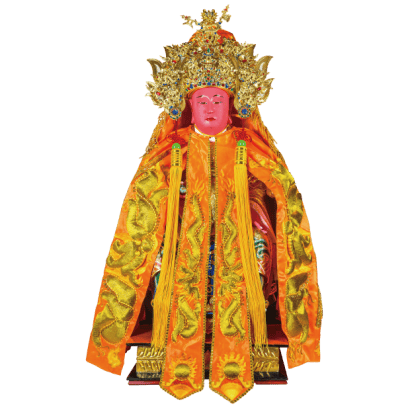 Siming True Lord
Siming True LordSiming True Lord
♦Sacred birth celebrated on the 3rd day of the 8th lunar month♦
The Kitchen God is known colloquially as Lord of the Stove, and also known as Siming True Lord, Lord of the Stove, Protector of the Home, or King of the Stove. His full title is Kitchen Commander of the East Nine Souls, Wang Dingfu Venerate Master. Worship of the Kitchen God is one of the five rites of offering (Home, Kitchen, Rain, and Travel) passed down in China since the Shang Dynast, indicating that the practice of making offerings to the Kitchen God has a long history. The 24th day of the 12th lunar month is the day when the Kitchen God departs from the mortal realm to report the actions and behaviors of each family to Jade Emperor, so each household performs a “Kitchen God Send Off” on the day. -
Read More
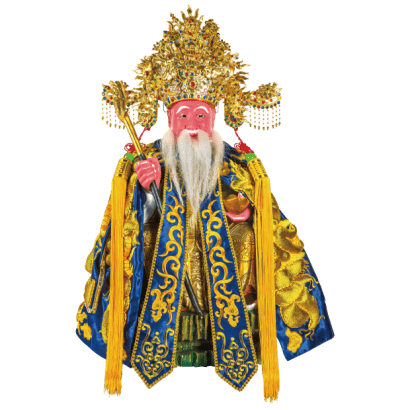 Right God of Blessing and Virtue
Right God of Blessing and VirtueRight God of Blessing and Virtue
♦Sacred birth celebrated on the 2nd day of the 2nd lunar month♦
Fude True God is usually referred to as the God of the Soil and the Ground, as well as “Elder Lord”, "Lord of Blessing and Virtue", "Great Elder Lord", Hòutǔ (Queen of the Earth), or simply as Tudi. As documented in books such as The Commentary of Zuo, The Book of Rites, the worship of the God of the Soil and Ground in China has existed since ancient times. These practices originated in a sense of reverence and gratitude for the land, and gradually evolved into the anthropomorphism of nature into a deified character. Folk beliefs hold that he can bless a successful agricultural harvest as well as bless merchants with business success, travelers with a safe journey, and even guard graves from evil demons. These are detailed in General Historica of Taiwan Province. -
Read More
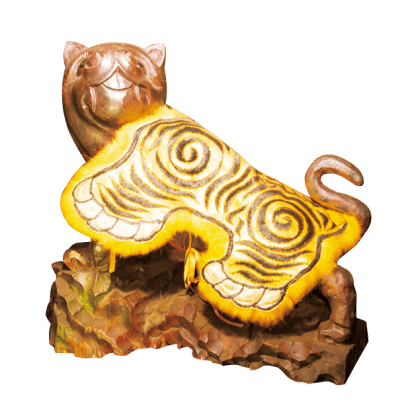 Tiger Lord
Tiger LordTiger Lord
♦Sacred birth celebrated on the 6th day of the 6th lunar month ♦
General Tiger Lord is also called Major General Tiger Lord, Tiger Venerate Lord. The variation in the names indicate differences in worship. Tiger Lord is a worship of an animal spirit, and often the shrine and offerings are placed below the altar table, called the lower altar. His role is to guard against invasion by external spirits, and serves as one of guardian deities of Mountain Gates of the Holy Temple Shrine. The tiger banner and dragon banner must protect the censer when entering the temple to perform the incense and fire ceremony. Conflict and competition exist between the tiger and the dragon. In the household, the blue dragon is on the left, and the white tiger on the right; shrines to the gods have a dragon side and tiger side, and a distance must be maintained from the tiger side – as tigers would attack if approached. The Tiger should be offered unboiled water in worship, and not with tea. -
Read More
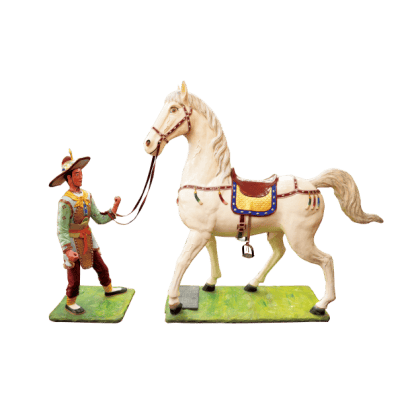 Horse Lord
Horse LordHorse Lord
♦Sacred birth celebrated on 8th day of the 2nd lunar month♦
The master deities that Horse Lord serves are mainly princes and masters of Dao with a military background. Among the temples in Taiwan today, there are few temples where the Horse Lord is worshipped except for temples dedicated to Princes (Millennium Lord, Qiansui). Horses are indispensable to military generals.

